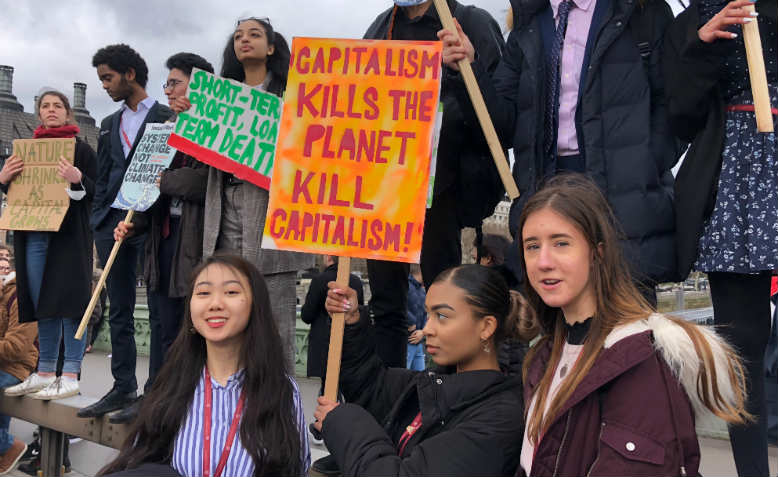 School students striking to demand climate action, Westminster Bridge, 15 March. Photo: Shabbir Lakha
School students striking to demand climate action, Westminster Bridge, 15 March. Photo: Shabbir Lakha
Joanne Davis reports on the young activists leading the fight for our futures
For many school, college and university students around the UK, Friday 15 February was no ordinary day. This time it was the system being taught a lesson, as thousands of students took to the streets to demand action on climate change. Driven by YouthStrike4Climate, around ten thousand protested in London as part of a co-ordinated day of action with 38 other towns and cities around the UK, which was followed by an internationally co-ordinated strike on 15 March that took place in over 100 countries.
The movement has been inspired by 16-year-old Swedish student Greta Thunberg, who communicates a sense of urgency which has resonated with young people around the world who will grow up with the increasingly disastrous consequences of climate change. She says: “I don’t want you to be hopeful. I want you to panic. I want you to feel the fear I feel every day, then I want you to act”.
While some world leaders, most notably Donald Trump, remain inside a bubble of climate change denial, others are prepared to talk the talk on climate change, yet remain fully complicit in the corporate-driven wrecking of the planet. Not least of these is Theresa May, who continues to promote fracking despite all the evidence, and protests, over the huge risks it poses to the environment and the English landscape.
Much of the conventional ruling class thinking on the climate crisis, even where they do accept one exists, does in many ways reflect its assessment of the economic crisis and David Cameron’s old mantra that ‘we’re all in this together’. That is to say that we all share equal responsibility. The ethos is one of individual lifestyle changes where we should all make sacrifices. While many schools and other education settings are very pro-active on this social responsibility aspect, a new generation has now shown that it is all too aware of where real responsibility lay. It is with those who are in positions of much greater power, and preside over a chaotic profit-driven system which treats the Earth and its inhabitants as collateral damage.
This is one of the most inspiring things about the school strikes. They are overtly political, placing responsibility squarely at the door of governments and big business. In London, students were even heard chanting ‘oh Jeremy Corbyn’ and there is a wide recognition amongst people of all ages that young people are growing up in a system which is failing them. This is also reflected in the demands of the UK Students Climate Change Network which, alongside calling for action on climate change, also calls for the voting age to be lowered to 16, and for the National Curriculum to be updated to include the ecological crisis as a top priority.
What is needed is a mass movement response which takes on the system as a whole. Young people have often provided a crucial ignition source for this, from the school walkouts over the Iraq War in 2003, to the tuition fee protests in 2010 which lit the fuse of the anti-austerity movements. These issues are linked. A profit-driven neoliberal system which cannot even provide affordable housing, free education and a living wage cannot be expected to provide the answers to arguably the most pressing crisis of the 21st century. That is, unless, they are stopped in their tracks by a mass movement geared towards social transformation.
Another strike has been called for Friday 12 April. The following statement from YouthStrike4Climate makes it very clear that this is a serious movement that will not be disappearing anytime soon:
“The world’s youth are waking up. Our leaders have failed us. They’re not doing enough to save our future. We must keep the pressure up to demand climate action. Whether you are at school, college or uni, go on strike… Join with youth from over 40 [now 100] countries across the world to fight for your future.”

